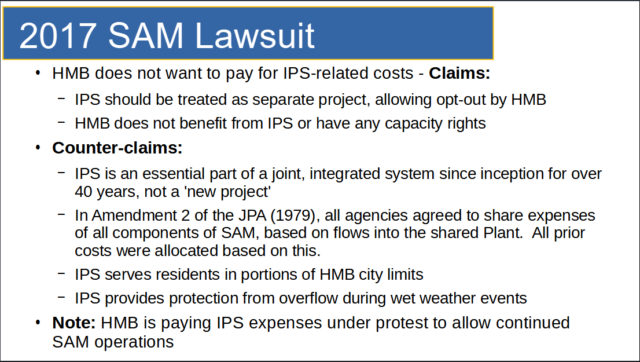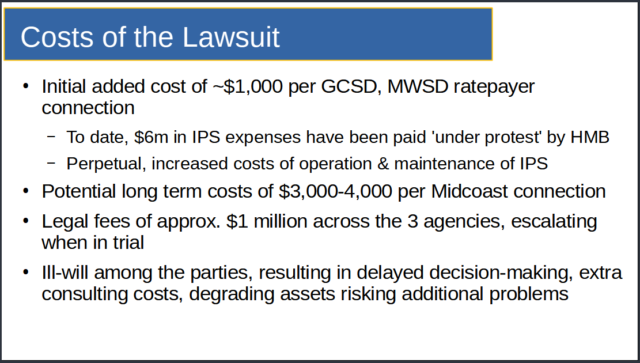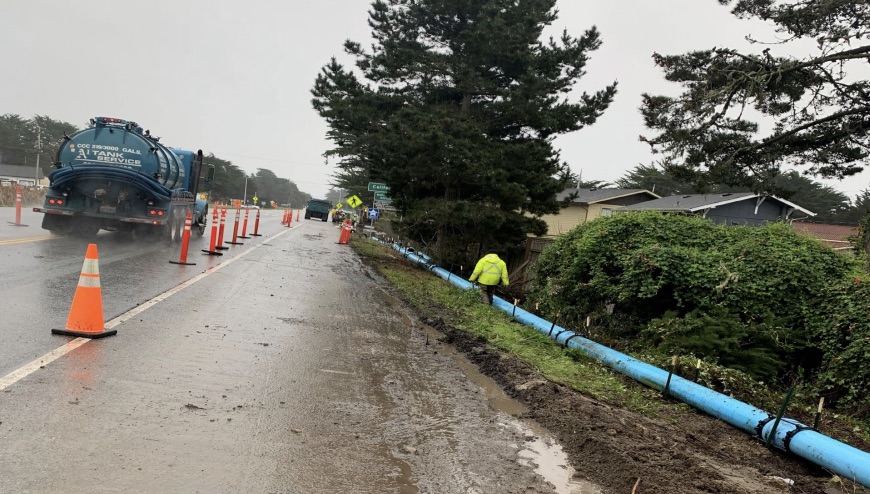|
Getting your Trinity Audio player ready...
|
OWN VOICE. ~ InPerspective by Gregg Dieguez —
Last night’s MCC meeting included a discussion of the lawsuit Half Moon Bay (HMB) filed against its Midcoast “partners” in the joint powers authority Sewer Authority Midcoast (SAM). While mostly tactful, there was clearly an emotional disagreement over the facts, and even a little Deceit Theater. It matters to Midcoast residents because thousands of dollars of extra charges are headed your way, if HMB wins this lawsuit.
Footnotes: to use, click the bracketed number and then click your browser Back button to return to the text where you were reading.
Images: Click to enlarge for improved readability in a new window.

We covered more details about this lawsuit in a prior Buzz article “Anatomy of a Lawsuit”, but updated information about the potential costs is contained in the MCC sewer lawsuit presentation last night, including the claims and counter-claims by the parties involved from a dated copy of the Santa Clara Court filings. The gist of the matter is contained in these two slides…
HMB Council Member Harvey Rarback stated that they were acting on behalf of their ratepayers, whom HMB leadership feels should not have to pay the costs of the essential ingredient in the joint sewer system – the Inter-tie Pipeline System (IPS) – which links the 3 member agencies together and enabled the creation and funding of the new sewer system in the late 70’s and early 80’s. He claimed that HMB did not benefit from the IPS, that the MCC presentation was Midcoast biased, and that HMB was merely waiting for a judge to decide on the merits of the case, which decision HMB would honor. I have to agree with part of what Harvey said: since the facts of the situation favor the Midcoast, the presentation WAS biased that way, towards the truth.
At this point an element of Deceit Theater came into play. HMB has not just been passively waiting for a decision. It appears they’ve spent over $600,000 of their resident taxpayers’ money to create and prosecute this case, and they are suing their own city residents (18% of GCSD customers live in HMB). Residents of Frenchman’s Creek and Miramar for example, will pay for both HMB’s cost of the lawsuit and for increased GCSD sewer expenses if HMB wins. In fact, HMB tried a covert maneuver at the April 26th SAM board meeting to trick the other parties into undermining their lawsuit defense. And a little birdie tells me Harvey understood this game before he participated in it.
Deceit Theatre (skip this if you don’t need details)

For some months, HMB has been asking for a switch to separate accounting for Capital Projects, and including infrastructure funding such as investments for IPS asset replenishment in that reorganization. I recognize some benefits from this method of accounting, and will in fact write a paper on how focused consideration of the perpetual costs of assets can improve the governance and fiscal sustainability of Public Works agencies. However, another birdie tells me HMB’s interest in this was stimulated by their lawyers, who advised delaying approval of the SAM budget at the April 26th SAM Board meeting until this accounting redefinition was agreed. There is a provision in the JPA agreement that “project budgets” are discretionary for member agencies, and can be “opted out of”. [The early 2017 plans for Recycled Water would have been treated in that manner, as an optional service.] The original General Budget, however, is mandatory participation and agencies which do not participate can lose their governance rights. So, if HMB had refused to fund the continuing operation of the foundational SAM budget, it could have lost its Board seats, and the remaining agencies could have set the terms and rates going forward. When HMB realized this, they agreed to continue funding the IPS asset replenishments, but “under protest” so that if they win the lawsuit, their share of the disputed monies (currently 58% based on flow) must be refunded to them.
Had this accounting change been a good faith suggestion by HMB, it would have included several things: 1) a specification of which General Ledger accounts (assets, liabilities, income and expense categories) were being moved or created and how historical financial statements would be restated under the new method, 2) a specification of how the newly reorganized accounting would be used to make decisions and assess fiscal status, and most fundamentally: 3) a statement of the expected benefits to SAM and its members from the accounting reorganization. I will certainly cover those topics in my future article on separating Capital Accounting for Managing Fiscal Sustainability. However, to my knowledge, no such details were provided to SAM for discussion. Failure to include those necessary details is like ordering a car, specifying the color, but failing to mention how many doors, what engine and drivetrain, you want. Thus, I must conclude…
The accounting reclassification ploy was an attempt to begin to unravel the legal basis that the other two agencies have for the IPS being an essential and integral part of the foundation of SAM’s system. Had IPS work been segregated, HMB could have used that as partial precedent that they should not be required to fund the pipes, tanks and pumps of the IPS. Fortunately, at the meeting, SAM counsel raised a concern about this reclassification, based upon his knowledge of the JPA, and subsequently issued a formal opinion, making it clear that such reclassification is not allowed under the current JPA – it would have to be part of a new, renegotiated JPA (which might be one result of the lawsuit).
Moving Forward – Together?
None of this is to say ill of the vast majority of HMB residents, who are good people. Further, City Management seems MUCH improved with the recent addition of Bob Nisbet as City Manager. It is completely understandable that the City, desperate for funds when the Beechwood lawsuit was hanging fire, would try to conserve costs. However, the costs they are conserving are not the City’s, but those paid by sewer ratepayers, and their bullying attempt is a zero-sum game which is trying to shift a financial burden to the Midcoast. The lawsuit stems from longstanding members of HMB leadership who are willing to bet the better part of a million dollars of their taxpayers’ money that they can re-interpret the longstanding terms of the JPA contract in their favor.
Most fundamentally, the benefit of the IPS to HMB was and is the creation of a modern sewer system which resolved the community’s pollution violations and allowed it to continue to grow and prosper. The state-mandated creation of the JPA also allowed grant funding, and lowered the costs for all members in construction, procurement, and operation of a joint sewer collection and processing system. There are specific additional benefits from the IPS to HMB, which they are denying, but which are in beneficial operation for HMB residents every day[*]. Also fundamental to all Coastside residents is that this lawsuit has delayed and increased the costs of needed projects (like the current Wet Weather Storage project on the Burnham Strip), and has distracted from a focus on very needed new projects like Recycled Water – in fact, specs for that project were agreed about a week before HMB filed the lawsuit in July, 2017. We could all have been working on a partial solution for this impending drought for the last four (4) years, and instead are arguing over a new interpretation of a 45 year-old contract.
Until this lawsuit is withdrawn by Half Moon Bay, or they lose it, consider doing your shopping and dining in Pacifica. For one thing, they need your business. For another, the leaders of Half Moon Bay do not deserve it.
FOOTNOTES:
[*] IPS benefits to HMB
See slide 5 of the MCC presentation: MCC 5/26/21 HMB-SAM Lawsuit Presentation
More From Gregg Dieguez ~ InPerspective
Mr. Dieguez is a native San Franciscan, longtime San Mateo County resident, and semi-retired entrepreneur who causes occasional controversy on the Coastside. He is a member of the MCC, but his opinions here are his own, and not those of the Council. In 2003 he co-founded MIT’s Clean Tech Program here in NorCal, which became MIT’s largest alumni speaker program. He lives in Montara. He loves a productive dialog in search of shared understanding.







I see this as yet another chapter in the SAM discord that has gone on between HMB and the unincorporated Midcoast sanitary districts for decades. The original SAM plant was engineered to be updated and enlarged in increments as demand grew. That all went out the window when rapidly mounting flows into the plant caused it to be precipitously enlarged (and paid for) all at once. As I recall, the biggest parts of those increased, unmanageable flows came from wet weather infiltration into the system in HMB (and not as much from the Midcoast) and from more rapid growth from development in HMB (the MWSD district had a years-long moratorium on new water hookups at the time).
Beyond unbalanced wet weather infiltration, we need to remember that what flows away in the wastewater system is a result of input from water systems. After years of back and forth, CCWD (the water-providing agency for HMB and El Granada that has long been dominated by HMB overgrowth interests) succeeded in getting approval for a much larger new pipe than needed north to El Granada in order to serve development interests. So unsustainable HMB-centric growth and development interests are, or at least will be, causing excessive water to end up in the IPS through the over-sized pipe. Will MWSD, with its own local water sources, be excused from paying the portion of the IPS used by the increased CCWD water deliveries?
There are many more cautionary tales, large and small, regarding HMB’s failure to play nicely at SAM with its neighbors to the north. Weaknesses in the JPA contract, usually to the detriment of the unincorporated communities, have been exposed from time to time, some involving an occasionally unworkable governing structure of the agency.
Is it any wonder many of us in the unincorporated communities instantly recoil away from any suggestion we should consolidate with the City of HMB? Not a single joint effort on the coastside–school district, fire district, library, etc., has ever gone smoothly and fairly. Cid is right–even for years before the tunnels were dug, many of us long-time residents of the Midcoast have looked to Pacifica because it is closer in time and, for many of us, distance than HMB proper for needs we cannot get locally.
This is an unfortunate situation. One reason I left Foster City for Moss Beach after many decades in 2019, besides over building, is because of a $90M levee improvement bond that residents have to pay down over 30 years. Foster City leadership refused to put any of their $90M surplus into. Now I’ve walked into this water and sewer mess. It’s clear that HMB leadership is not working in good faith.
I am already shopping in Pacifica…too much Traffic Gridlock which they consistently FAIL to address!
Gregg has done excellent work on this article. I disagree with him on boycotting HMB businesses. Many are owned by Midcoast residents. Many Midcoast residents are employed there. Support local businesses
Others share your concern. I’m open to suggestions on how to exert influence on HMB to withdraw that unjustified lawsuit.